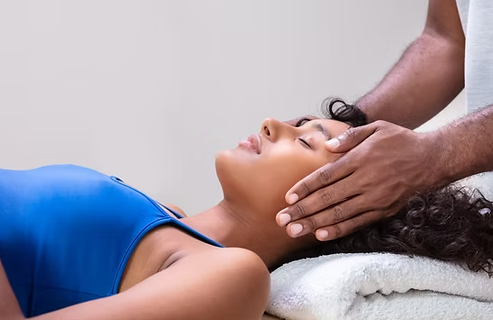
Associate Degree in Complementary and Alternative Therapies
Program Overview:
The Associate Degree in Complementary and Alternative Therapies (CAT) provides foundational education and hands-on skills in holistic health and natural healing approaches. Students explore integrative therapies like herbalism, aromatherapy, massage, Traditional Chinese Medicine (TCM), and more. This two-year program prepares graduates for entry-level positions in wellness centers, spas, or to continue toward a bachelor's degree in health sciences or holistic medicine.
🕒 Program Duration:
-
2 years (4 semesters)
-
60–64 credit hours
🎯 Program Learning Outcomes:
Graduates will be able to:
-
Understand the principles and practices of major complementary therapies.
-
Apply ethical and evidence-informed practices in client care.
-
Integrate CAT modalities into broader health and wellness contexts.
-
Perform basic assessments and recommend holistic health interventions.
-
Collaborate effectively with conventional and integrative healthcare professionals.
🧱 Degree Structure:
📚 Core Courses (36 credits):
-
Introduction to Complementary and Alternative Therapies
-
Holistic Health and Healing
-
Foundations of Herbal Medicine
-
Aromatherapy and Essential Oils
-
Introduction to Traditional Chinese Medicine
-
Principles of Ayurveda
-
Energy Medicine and Reiki
-
Massage Therapy Fundamentals
-
Ethics and Legal Issues in Holistic Practice
-
Anatomy & Physiology for Holistic Practitioners
-
Integrative Health Practices
-
Mind-Body Techniques: Meditation, Yoga, and Stress Relief
🧪 General Education (20–24 credits):
-
English Composition
-
Introduction to Psychology or Sociology
-
Human Biology
-
Health and Wellness
-
Communication Skills
-
Math for Health Sciences
📚 Course Descriptions & Syllabus Breakdown
🔹 Course 1: Introduction to Complementary and Alternative Therapies
Description:
Explores the history, philosophy, and modern use of complementary and alternative therapies. Students examine key CAT modalities and their roles in health promotion and disease prevention.
Modules:
-
Defining Complementary, Alternative, and Integrative Medicine
-
Historical and Cultural Roots of CAT
-
Common Modalities Overview (Herbal, Massage, Acupuncture, etc.)
-
Regulation, Certification, and Safety
-
Research and Evidence in CAT
-
Case Studies in Integrative Medicine
🔹 Course 2: Holistic Health and Healing
Description:
Focuses on holistic models of care, including the mind-body-spirit connection and wellness-based lifestyle interventions.
Modules:
-
Principles of Holistic Health
-
Wellness and Preventative Care
-
Spiritual and Emotional Dimensions of Healing
-
Lifestyle Medicine and Self-Care
-
Environmental and Social Determinants of Health
-
Cultural Competency in Holistic Practice
🔹 Course 3: Foundations of Herbal Medicine
Description:
Covers the identification, preparation, and use of medicinal herbs to support health and treat common conditions.
Modules:
-
Introduction to Herbal Pharmacology
-
Safety, Ethics, and Dosing Guidelines
-
Herbal Materia Medica (Top 20 Herbs)
-
Herbal Preparation Methods (Teas, Tinctures, Salves)
-
Herbal Protocols for Digestive, Immune, and Nervous Systems
-
Creating a Personal Herbal Apothecary
🔹 Course 4: Aromatherapy and Essential Oils
Description:
Explores essential oils for therapeutic purposes, including blending techniques, safety, and clinical uses.
Modules:
-
Chemistry and Extraction of Essential Oils
-
Safety, Dilution, and Contraindications
-
Aromatherapy for Stress, Sleep, and Mood
-
Immune Support and Respiratory Conditions
-
Creating Personal Care Products
-
Case Applications in Aromatherapy
🔹 Course 5: Introduction to Traditional Chinese Medicine (TCM)
Description:
Introduces key concepts in TCM, including Qi, meridians, yin-yang theory, and basic diagnostics.
Modules:
-
History and Philosophy of TCM
-
The Five Elements Theory
-
Qi, Blood, and Body Fluids
-
Meridian Theory and Acupoints
-
Introduction to Acupuncture and Moxibustion
-
Chinese Herbal Therapy
🔹 Course 6: Principles of Ayurveda
Description:
Covers Ayurvedic approaches to wellness based on doshas, diet, and natural remedies.
Modules:
-
Origins and Philosophical Foundations
-
The Three Doshas: Vata, Pitta, Kapha
-
Ayurvedic Nutrition and Lifestyle
-
Daily Routines and Seasonal Cleansing
-
Common Ayurvedic Remedies
-
Application of Ayurveda in Western Contexts
🔹 Course 7: Energy Medicine and Reiki
Description:
Explores the theory and application of energy-based healing techniques, with an emphasis on Reiki.
Modules:
-
Energy Anatomy: Chakras and Auras
-
The Science of Biofields
-
History and Principles of Reiki
-
Hand Positions and Treatment Protocols
-
Intuition and Client Communication
-
Ethics and Professional Practice
🔹 Course 8: Massage Therapy Fundamentals
Description:
Provides a practical introduction to massage theory, basic techniques, and therapeutic applications.
🔹 Course 9: Ethics and Legal Issues in Holistic Practice
Description:
Focuses on ethical considerations, client-practitioner boundaries, confidentiality, and state regulations.
🔹 Course 10: Anatomy & Physiology for Holistic Practitioners
Description:
Covers basic structure and function of the human body with a focus on systems relevant to CAT.
🔹 Course 11: Integrative Health Practices
Description:
Examines how to blend holistic therapies with conventional medicine for client-centered care.
🔹 Course 12: Mind-Body Techniques: Meditation, Yoga, and Stress Relief
Description:
Introduces students to stress-reduction techniques through breathwork, guided meditation, and basic yoga.
Course Access
You'll be added to this within 24 to 48hrs after purchase. Please make sure you put a working email address as your login will be emailed to you.
Program Duration and Study Hours
Duration: 2 Years
All online courses must be completed within the allotted time
If you have not completed your course within allotted time, we reserve the right to restrict access to your course.
For questions regarding this policy, please contact us
Accreditation Status
This course is not currently accredited
Future Plans for Accreditation Status
Yes, though this program is not fully accredited we do have future plans to apply for accreditation for this program.
Awards
Associate degree Diploma of Completion



